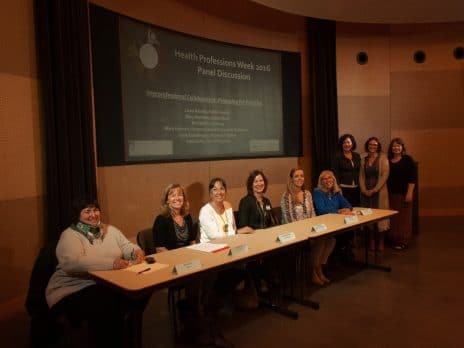
On September 27th, in honor of Health Professions Week, faculty members representing six different disciplines spoke with students from NAU’s Social Work Program and College of Health and Human Services about Interprofessional Collaborative Practice.
As Nurse Ro Haddon said, “Interdisciplinary teams can increase patient satisfaction, improve quality of care, and decrease length of stay for hospitalized individuals.” Students were encouraged to develop expertise in their professions, build relationships with experts from other disciplines, and use teamwork to provide optimum client care.
Particularly compelling were the many personal stories shared, where team work created new opportunities to improve outcomes for the families, individuals, and communities served. Early in her career, Physical Therapist Lorie Kronenberger was assigned a patient in terminal condition. When it became clear that the patient was unwilling or unable to work toward physical therapy goals, Lorie felt it necessary to deny further care.
As a result of this denial, the patient came very close to being discharged from the hospital – a discharge that would have stripped him of critical access to basic needs, while in extremely fragile condition. Fortunately, a group of other practitioners in the facility were able to bring their experience to bear on the situation. The patient’s needs were met more effectively by a broader team, and the patient was able to continue treatment under the care of different disciplines, remaining covered by insurance. This was a turning point for Lorie professionally, and shows the value of treatment plans that take many perspectives into account.
As panelist Laura Bounds suggested, “Be active. Reach out. Learn new terminology. Speak in a Language your patients understand, and be sure to listen. Students in NAU’s College of Health and Human Services have a unique opportunity to broaden their perspectives through encounters with professionals from many other disciplines.”
The event, sponsored by the Child Welfare Training Project, was well-received, with 72 students and faculty in attendance. Planning is underway to make this an annual event. As co-organizer Natalie Cawood said, “We all recognize that our clients and patients have complex medical and social needs. We hope this presentation helps NAU’s future Social Workers, Nurses, PTs, Speech/Language Pathologists, and other medical and dental professionals begin to speak a common language, and prepare to practice collaboratively.”
Many thanks to our wonderful presenters:
Amy N. Smith, RDH, MS, MPH
Assistant Clinical Professor/Public Health Coordinator, Department of Dental Hygiene
14 years clinical dental hygiene experience in private practice and public venues.
Lorie Kroneberger, PT, DPT, Board Certified Specialist in Geriatric PT
Associate Clinical Professor/Academic Coord. of Clinical Education, NAU Program in Physical Therapy
34 years licensed PT with a background in acute care, skilled nursing, home health, outpatient orthopedics and wound care consulting; teaching in the doctoral program at NAU since 2007.
Laura Bounds, EdD, MCHES Associate Clinical Professor in the Department of Health Sciences.
20 years teaching experience in higher education with a focus on public health topics. There is a broad range of allied and public health students in these courses who bring interprofessional concepts and experiences to the classroom. Public health internship supervisor in AZ and nationally.
Mary Towle Harmon, PhD, CCC-SLP Associate Professor, Dept of Communication Sciences and Disorders
20 years speech language pathologist, specialty in preschool-high school, with a particular interest in early literacy and interprofessional education.
Mary Damskey, MSW, ACSW, NASW
Associate Professor of Social Work
7 years social work practice in psychiatric hospital and Neo-Natal ICU. 3 years working with children with disabilities on the Navajo reservation.
Rosalinda Haddon, M.A., R.N.
Associate Clinical Professor, NAU College of Nursing
Former hospital VP, with experience in nursing and community health. Focus on leadership, quality management, ethics, advocacy, cultural aspects of death and dying, American Indian health-care practices, and therapeutic touch. At NAU since 1998.
